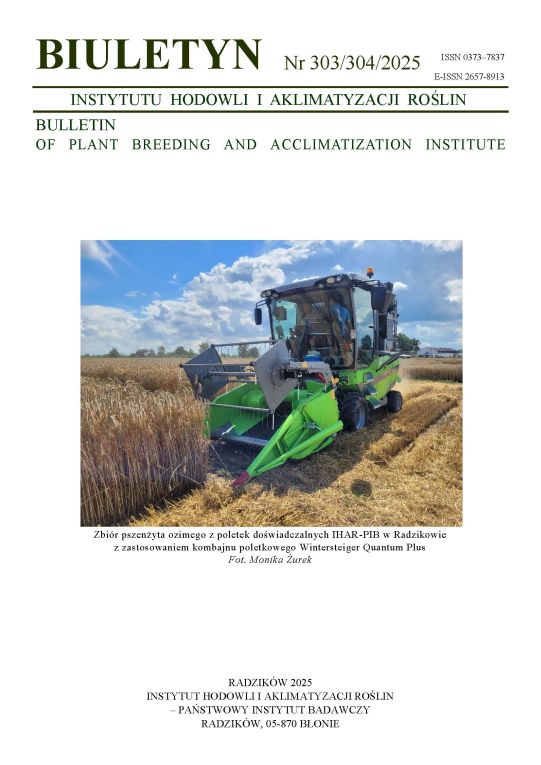Quality parameters of potato offered for food processing
Barbara Krzysztofik
iemeipp@urk.edu.plInstytut Eksploatacji Maszyn Ergonomii i Procesów Produkcyjnych, Uniwersytet Rolniczy, Kraków (Poland)
Abstract
The aim of this study was a qualitative analysis of potato tubers offered by the holding engaged in the cultivation of varieties for the French fries produced in the company "FRITAR". The study involved four varieties of potato (Agnes, Asterix, Fresco and Innovator), the quality of which was assessed on the basis of the receipt minutes made when the material was received by the processor. The study addressed the following tubers parameters: the dry weight, yield structure, taking into account two dimensions (length and width of the tuber), the share of green tubers, share of tubers with dry and wet rot, mechanically damaged, infested by scab, wilted, sprouted, deformed, damaged by pests, with internal defects, of a size less than 35 mm in diameter of the transverse part and the amount of mineral impurities. Rating of the tubers targeted for processing into potato chips showed that the cultivars total contribution of external and internal defects has not been exceeded.
Keywords:
cultivar, defects, potatoes, the quality indicatorReferences
Chotkowski J. 2009. Polski katalog odmian ziemniaka. Wieś Jutra 301.
Google Scholar
Gruczek T. 2001. Technologia ziemniaka jadalnego i dla przetwórstwa spożywczego przy szerokości międzyrzędzi 75 cm. IHAR Jadwisin.
Google Scholar
Hamrol M., Mantura W. 2002. Zarządzanie jakością – teoria i praktyka. PWN Warszawa.
Google Scholar
Holenderski katalog odmian ziemniaka. 2007. NIVAP. Holland. www.nivap.nl.
Google Scholar
Lisińska G. 2006. Wartość technologiczna i jakość konsumpcyjna polskich odmian ziemniaka. Zesz. Probl. Post. Nauk. Roln. 511: 81 — 94.
Google Scholar
Mozolewski W. 2005. Badania związków między jakością odmian ziemniaka a jakością chipsów i frytek. Rozpr. Monogr. UW–M Olszt.: 77.
Google Scholar
Piasecki M., Gruchała L., Sobiech S. 1996. Jakość surowca a właściwości sensoryczne frytek. W: Materiały Konferencji Naukowej nt.: Ziemniak jako surowiec do przetwórstwa spożywczego. 28–29 maja, Instytut Ziemniaka, Bonin. IZ, Bonin: 60 — 64.
Google Scholar
Sawicka B., Barbars P. 2011. Zależność jakości frytek od składu chemicznego bulw ziemniaka w ekologicznym i integrowanym. Dział: Nauki o Żywności i Żywieniu Tom 5, Zeszyt 1, ISSN 1897-7820.
Google Scholar
Sobol Z. 2006. Wpływ wybranych czynników na gęstość bulw ziemniaka. Acta Agrophys. 8/ 1: 219 — 228.
Google Scholar
Tajner-Czopek A. 2000. Konsystencja frytek ziemniaczanych w zależności od zawartości i składu polisacharydów w surowcu. Żywn. Nauka Technol. Jakość Supl. 25/4: 228 — 231.
Google Scholar
Zgórska K. 2002. Jakość ziemniaków jadalnych i do przetwórstwa spożywczego. Ziemn. Pol. 4: 14 — 20.
Google Scholar
Zgórska K. 2004. Wymagania jakościowe wobec odmian ziemniaka do przetwórstwa spożywczego. Ziemn. Pol. 4: 26 — 28.
Google Scholar
Zgórska K., Frydecka-Mazurczyk A. 2000. Wpływ warunków w czasie wegetacji oraz temperatury przechowywania na cechy jakości ziemniaków przeznaczonych do przetwórstwa. Biul. IHAR 213: 239 — 251.
Google Scholar
Zgórska K., Frydecka-Mazurczyk A. 2002. Przydatność nowych polskich odmian ziemniaka do przetwórstwa spożywczego. Zesz. Probl. Post. Nauk Roln. 489: 347 — 354.
Google Scholar
Authors
Barbara Krzysztofikiemeipp@urk.edu.pl
Instytut Eksploatacji Maszyn Ergonomii i Procesów Produkcyjnych, Uniwersytet Rolniczy, Kraków Poland
Statistics
Abstract views: 285PDF downloads: 115
License
Copyright (c) 2012 Barbara Krzysztofik

This work is licensed under a Creative Commons Attribution-ShareAlike 4.0 International License.
Upon submitting the article, the Authors grant the Publisher a non-exclusive and free license to use the article for an indefinite period of time throughout the world in the following fields of use:
- Production and reproduction of copies of the article using a specific technique, including printing and digital technology.
- Placing on the market, lending or renting the original or copies of the article.
- Public performance, exhibition, display, reproduction, broadcasting and re-broadcasting, as well as making the article publicly available in such a way that everyone can access it at a place and time of their choice.
- Including the article in a collective work.
- Uploading an article in electronic form to electronic platforms or otherwise introducing an article in electronic form to the Internet or other network.
- Dissemination of the article in electronic form on the Internet or other network, in collective work as well as independently.
- Making the article available in an electronic version in such a way that everyone can access it at a place and time of their choice, in particular via the Internet.
Authors by sending a request for publication:
- They consent to the publication of the article in the journal,
- They agree to give the publication a DOI (Digital Object Identifier),
- They undertake to comply with the publishing house's code of ethics in accordance with the guidelines of the Committee on Publication Ethics (COPE), (http://ihar.edu.pl/biblioteka_i_wydawnictwa.php),
- They consent to the articles being made available in electronic form under the CC BY-SA 4.0 license, in open access,
- They agree to send article metadata to commercial and non-commercial journal indexing databases.
Most read articles by the same author(s)
- Barbara Krzysztofik, Effect of seed size and planting density on the potato tuber yield and quality , Bulletin of Plant Breeding and Acclimatization Institute: No. 266 (2012): Regular issue
- Barbara Krzysztofik, Krzysztof Sułkowski, Effect of selected factors on the value of mechanical damage index of potato tubers destined for food processing , Bulletin of Plant Breeding and Acclimatization Institute: No. 266 (2012): Regular issue













